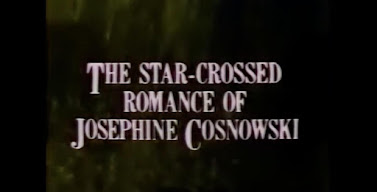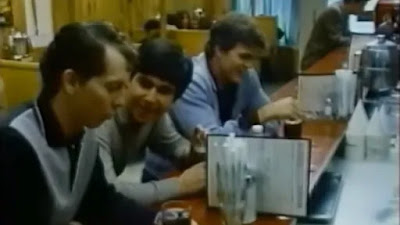Directors
Akinori Nagaoka and Minoru Okazaki
English Voice Cast
Dracula - Tom Wyner
Dolores - Arlene Banas
Rachel Van Helsing - Melanie MacQueen
Frank Drake - Daniel Woren
Janus - Max Christian
Satan - Richard Epcar
Directed by Akinori Nagaoka and Minoru Okazaki (who later directed several episodes of Dragon Ball and Dragon Ball Z), this movie is based on Marvel's horror comic series The Tomb of Dracula.
It was released in Japan in 1980, and then acquired by Harmony Gold Production Company, dubbed in English, and barely released on U.S. cable television in 1983.
Marvel's comic series, created by Marv Wolfman, Gerry Conway, Gardner Fox and Archie Goodwin, ran from 1972 to 1979, with 70 issues surrounding a group of vampire hunters facing off with Dracula as well as other supernatural creatures and monsters.
Once in a while, Dracula would team up with his adversaries to battle these other-worldly beings. But normally it was one against the other.
The movie starts with a narrator bolstering up how evil Dracula is.
While living in Transylvania, he was besieged by a group of vampire hunters, flees and hides in Boston.
Later, a cult calling itself "The Disciples of the Black Mask" attempts to summon ol' scratch himself, Satan, in order to present him with a bride. They hold this ritual inside a church for the sake of desecrating it.
The cult disciples do summon an entity whom they believe is Satan, and present to him a bride named Dolores.
He snatches Dolores and flies out the window. The disciples realize it was Dracula rather than Satan.
He takes her back to his downtown apartment where he tries to turn her into a vampire by consuming her blood, but he can't bring himself to do it because he's fallen in love.
He flees in frustration to feed on the blood of other women so as to quench his insatiable thirst.
Dracula does make Dolores his wife, and they have a son together named Janus.
After his birth, Dracula comes clean to Dolores about his true identity as she believed he was really Satan the whole time.
The real Satan manifests himself to the leader of the cult, and the two swear revenge on Dracula for taking Dolores as his own bride.
Meanwhile, two vampire hunters named Dr. Hans Hawker, Rachel Van Helsing, and their vampire-sniffing dog, Elijah, seek the help of a guy named Frank Drake as he's highly skilled in martial arts, in finding and killing Dracula.
He's reluctant at first, but does decide to join their efforts.
A year goes by, and Dolores has since regained her self-esteem thanks to Dracula. And his once cold and unsympathetic heart has warmed up with love once again, just as before he was turned to a vampire.
Also, the small gang of hunters still haven't found him.
For some reason I missed, Dracula and his family head to the church where the cult holds its rituals. Unbeknownst to them, but knownst to us, they're followed there by the vampire hunters.
They become trapped by the cult leader who tries to kill Dracula with a silver bullet. (I thought silver bullets only killed werewolves, but I guess in the Marvel Cinematic Universe, they also kill vampires).
The bullet misses Dracula, and hits baby Janus instead, killing him.
Dracula kills the cult leader in anger, and the hunters then make their presence known. They intend to kill him, and Dolores begs Dracula not to attack and kill them instead.
Later, Dolores goes to the grave of her son to kill herself in sadness and despair for having given herself so freely to the service of the devil.
Heaven then intervenes. She begs heaven for forgiveness, and Janus is revived.
He rises from the grave as an adult, complete with body tights, and has a God-given mission to kill Dracula. She begs him not to, but he can't go against his divine duties. Janus changes to a gold eagle, and flies off to kill his father.
Father and son fight after Dracula wanders the night searching for a victim, but yet again, Dracula flees.
Satan comes around and takes away Dracula's immortality and the rest of his powers, leaving him a mortal.
Janus won't kill him since he's mortal, but Dracula turns to another vampire named Lela requesting she make him a vampire once again.
Lela refuses, and turns on him in revenge as he's the one who turned her into a vampire.
So, he's forced to return to Transylvania where he seeks the aid of another vampire named Malissa.
He orders her, as her master, to make him a vampire once again, but she also refuses.
Malissa says she has a new master named Sir Tomo, whom she calls on to destroy Dracula.
Sir Tomo raises other vampires from the dead to attack him.
The vampire hunters have also followed Dracula to Transylvania were both the undead, and the vampire hunters, battle him in the ultimate showdown.
There's so much happening in this 60 minute film, filled with a lot of exposition.
The poor English dubs, and stiff animation reminiscent of early 80s Saturday morning cartoons, it was a bit difficult to get invested in this movie.
At times, I didn't know who I was supposed to be rooting for. Did Dracula turn good despite being labeled all sorts of nasty things pertaining to darkness and evil? He's even called the "tragic and terrifying personification of the cruel conflict between the affirmation of life and the corruption of death." But, in the plus column, Dracula is a good husband and father.
 |
| Tomb of Dracula #10 - first appearance of Blade, the Vampire-Slayer |
At other times, I couldn't follow certain decisions made by the characters. For instance, after Dolores repents for having turned to Satan, she goes back to the church where the rituals take place. Why?
Dracula, Sovereign of the Damned is very much a melodramatic horror love story.
Somehow, overall it's a fun watch despite the flaws, loads of exposition, bad English dubs, choppy animation, and a scene where Dracula eats a hamburger. Yeah!...That's in there.
Scenes of horror are also depicted, mostly with close-ups of Dracula's gleaming fangs piercing the slender necks of his female victims, draining their blood, and leaving them as soon-to-be undead corpses doomed to continue his evil work of creating more vampires.
The ending is a fun horror ride as the movie saves monsters and mayhem for the last act.
It took some patience to get there.
Some of the animation was good. At other times, it seemed far less than perfect, even cheap. Despite that, some of the imagery is memorable and well done, making the movie a true horror film indeed.
The storyline for the movie diminishes a lot of the subplots from the comic series, or omits them altogether.
For instance, the comic series introduced readers to Blade, the Vampire Slayer in The Tomb of Dracula #10. He becomes a reluctant ally to the vampire hunters in the comics. Had Blade made an appearance in this animated movie, chances are it may have been more well known that it currently is.
He was portrayed by Wesley Snipes in the films Blade, Blade II, and Blade Trinity. Sticky Fingaz played the character in the TV series Blade back in 2006.
Comic book fans, and fans of horror in general, can certainly find something enjoyable in this production. But it could certainly use a retooling for sure.
Editor's Note:
Previously, I had mentioned a list I made containing approximately 30 titles of obscure and under-rated movies based on comic books. I originally intended to review those 30 titles. But I've found that a portion of them are difficult, if not nearly impossible to find. So, that list of 30 will be cut back, and I'll just have to watch and review what I can.
At this point, I'm thinking of reviewing no more than another 10 comic-based movies. Afterwards, I'll move on to my next little project for this blog - a project I'm excited to start.






